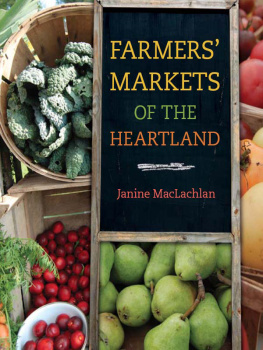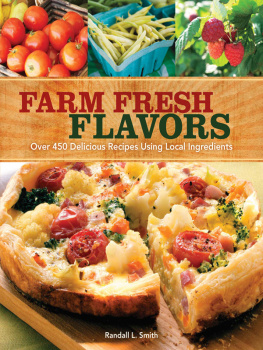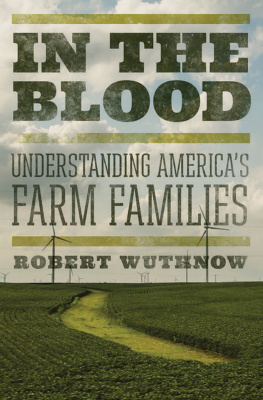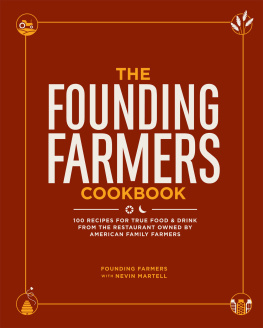Gaining Ground
Gaining Ground
A Story of Farmers Markets, Local Food, and Saving the Family Farm
Forrest Pritchard

LYONS PRESS
Guilford, Connecticut
An imprint of Globe Pequot Press
Copyright 2013 by Forrest Pritchard
ALL RIGHTS RESERVED. No part of this book may be reproduced or transmitted in any form by any means, electronic or mechanical, including photocopying and recording, or by any information storage and retrieval system, except as may be expressly permitted in writing from the publisher. Requests for permission should be addressed to Globe Pequot Press, Attn: Rights and Permissions Department, PO Box 480, Guilford, CT 06437.
Lyons Press is an imprint of Globe Pequot Press.
All photos by the author.
Project editor: Meredith Dias
Text design: Lisa Reneson, twosistersdesign.com
Layout: Justin Marciano
Library of Congress Cataloging-in-Publication Data is available on file.
E-ISBN 978-0-7627-9438-6
To my teachers, especially Laura Robb, who read poetry to their students. I listened.
Career opportunities are the ones that never knock.
The Clash, 1977
CONTENTS
FOREWORD
Why do we read adventure and travel books about places weve never visited and cant possibly imagine having the wherewithal to visit? Answer: All of us fantasize about the other world in which people live.
In todays profound disconnect with our ecological dependency generally, and with food production (also known as farming) specifically, a book about profitable farming from an agricultural adventurer could be classified in this travel genre. I remember the day Forrest and his dad came to Polyface for a visit. Of course, I had no idea of the angst behind the trip that Forrest describes with impeccable clarity and gut-wrenching transparency in this wonderful book.
But in only a few minutes, as they stood on the threshold of my front door, I could tell that here was a young man who truly believed he could do what reasonable menlike his fatherconsidered madness: make a living on a farm. No outside paycheck. No off-farm-derived nest egg to provide life support. Just straight-up farming as a credible business. We walked the farm that day like I do with thousands of bright-eyed farmer wannabes, discussing how-to, looking at portable infrastructure, and frequently delving into big-picture ideology and politics. Over the years Ive followed Forrests progress from afar, met a few of his customers, and enjoyed his success as a vicarious extension of my own. Too many dont follow through. Forrest has. And is.
Forrest has done all of us a great service in eloquently articulating the emotional turmoil, familial prejudices, and personal doubts that accompany the announcement from smart, well-educated young people: I want to farm for a living. I dont know any full-time farmer under fifty years old who has not encountered, to some degree, this well-meaning prejudice from family and friends: But why would you want to throw your life away doing the drudgery and work for little pay?
Those of us who have survived in this business for a few decades know both the brutality and brilliance of farming. Were pounded by weather, government regulations, societal marginalization, pests, and sickness. But more often, we step into the brilliance of dew-diamonds dripping off orchard grass in the early morning sun.
Since Forrest and I live not too far apart, we share similar surroundings and similar rural beauty. Daily, we enjoy natures balm for the soul... if we can stop from mending fences, cutting wood, and repairing the hay mower long enough to behold the decor of our office.
This tension between getting it done and enjoying it is what makes the life of a real farmer such a difficult adventure to comprehend. Forrests stories and descriptions touch me deeply because they are mine. Ive lived them too. A few years ahead, but incredibly similarly. I remember looking out on our farm as a young man, inheriting it from my parents, yearning to do what they did not do: make it and it alone a full-time living. The first year, I started selling firewoodjust like youll see Forrest describe. The first several years were touch and go. But gradually it progressed.
Too many people see only one end of the farming spectrum. They either see all the long hours, work, and sweat, or they romanticize it into some idyllic pastoral fantasy of nature-communing and luxury. The truth, as Forrest so perfectly captures, is in the middle. Its a middle incomprehensible to most people in our culture, who are far removed from a true farming lifestyle and ethic.
While farmersboth the dabblers and the full-timerswill thoroughly enjoy this book, I think its best audience is the seeker, the adventurer who will never farm. Why? Because those of us out here doing the real work of farming desperately need the rest of the world to come on this journey with us. Not everyone can farm. Not everyone should. Assuredly, no one would want me to design and fly an airliner. By the same token, most folks are not cut out to be farmers.
But farming determines the landscape our grandchildren will inherit. Farming determines the quality of our food, the humane handling of our animals. Every time we eat, we participate in farming. This is why everyone needs to take this journey with Forrest, to vicariously enjoy this adventure with him. We cannot escape our responsibilities to, nor our interactions with, soil, air, and waterthe basic ingredients in the farmers alchemy.
Acquainting ourselves with the ecstasy and the heartache of farming creates integrity in our food decisions, common sense in our land-use policies, and appreciation of the effort required to correctly massage our ecological womb.
Unlike other vocations that are arguably more or less necessary, farming is basic to human existence. Because it is at the root of civilization, it has perhaps the greatest capacity to either heal or hurt humankinds planetary nest. As co-stewards of this great creation, we all owe future generations the benefit of knowing something about farming, food production, and land care. Few intellectual journeys could be this necessary and far-reaching. For this reason, I think adding adventurous farming books to the mixalong with novels, business books, biographies, and other genresis a must for well-rounded people.
Forrest has blessed us with a delightful peek into this farming life, and I invite you to travel with him during the metamorphosis: from dreamer to doer. Not that any of us ever stops dreaming. But when we actually do turn some dreams into doing, well, I agree with Forrest: Thats gaining ground.
Joel Salatin, September 2012
INTRODUCTION
A lot can be learned from baking a cake.
As a child, I helped my grandmother sift flour and crack eggs for her famous pound cakes, regional treasures she sold each Sunday morning in the parking lot after church. Having spent her formative years struggling through the Great Depression, she let nothing go to waste in her kitchen. With a practiced index finger, she wiped the eggshells clean before composting them. The previous weeks newspaper was spread out to capture sifted flour, ensuring that every speck was accounted for. She even saved old butter wrappers, using them to grease the cake pans.
Fresh from the oven, her cakes emerged as golden, encrusted halos, moist and fragrant, dense and delicious. Served as a thick wedge, with a glass of fresh milk provided by our next-door neighbors dairy, they were the epitome of freshness, wholesomeness, wonderfulness.
But it was this very glass of milk that let me know, even as a preschooler tied to my grandmothers apron strings, that something was amiss. My grandmother drove me once a week to the neighboring dairy and parked her car in front of the milking parlor. Each time, before we entered, she cautioned me.
Next page







